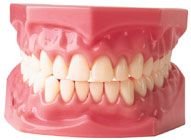 Irregularities with your mouth and teeth, as well as certain abnormalities or irregularities with your facial features, are typically treated by specialists in orthodontic dentistry.
Irregularities with your mouth and teeth, as well as certain abnormalities or irregularities with your facial features, are typically treated by specialists in orthodontic dentistry.
The most common problems treated by orthodontists are related to overbites and underbites. A bad bite is an improper relationship between your upper and lower teeth; crooked or crowded teeth are often the culprit. This is also called a “malocclusion.” A malocclusion, which can happen over time or is inherited, can be treated with such dental appliances as braces, which are designed to restore your oral features (jaws, teeth and lips) into their proper balance. Moreover, bite problems can have an impact on your overall appearance.
Acquired malocclusions can occur as a result of a variety of things, including disease, thumb-sucking as a child, premature loss of teeth, an injury, or obstructive tissues such as your tonsils. Such problems can be minor in nature; many of us, for example, may have one or two teeth that are not perfectly straight or are even crooked. In other cases, bite problems can lead to premature loss of teeth, destruction of bone structures, speech and eating problems, difficulty in caring for teeth and premature tooth decay, as well as emotional distress.
Untreated malocclusions can also cause jaw joints to fall out of alignment; this can lead to chronic headaches, or facial and neck pain.
Symptoms that trigger orthodontics
If you are unsure whether you need to see an orthodontist, consider the following symptoms as a possible cue to do so:
- Frequent biting of your cheek, or cutting the roof of your mouth with a tooth.
- New erupting teeth that don’t come in straight.
- Problems speaking, or problems eating, such as chewing food properly.
- Teeth don’t make contact on one side of your mouth.
Contact Us
Our Location
Find us on the map
Kennedy Township
327 Forest Grove Rd
Coraopolis, PA 15108, US
Hours of Operation
Our Regular Schedule
9:00 am - 7:00 pm
Closed
7:00 am - 5:00 pm
Closed
9:00 am - 12:00 pm
Closed
Closed